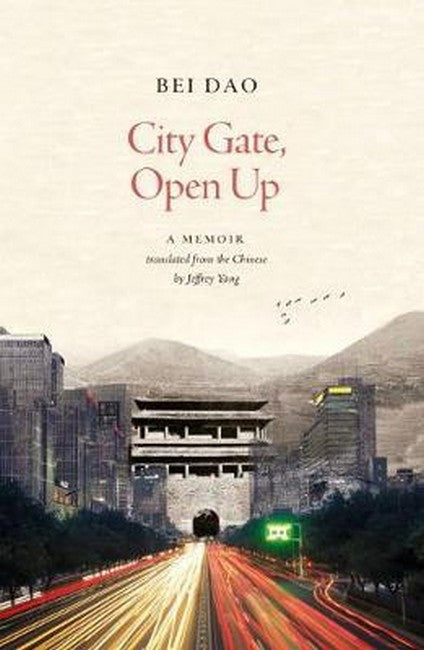Bei Dao (the pseudonym means `north island) was born in Beijing in 1949. Educated into the beliefs of Communist China, his subsequent disaffection found its voice in poetry, for which he has been nominated for the Nobel Prize on several occasions. Since 1989 he has lived first in Europe, then in the USA, and finally Hong Kong, where he teaches at the Chinese University of Hong Kong. He is an honorary member of the American Academy of Arts and Letters. His poetry in English translation includes The August Sleepwalker (1988), Old Snow (1992), Forms of Distance (1994), Landscape Over Zero (1998) and Unlock (2006). He has also published several collections of essays, including Midnights Gate (2007).
Description
Reviews
The language of Bei Daos memoir, seamlessly translated by fellow poet Yang, is elegantly simple and guilelessly accessible....Winter white cabbage, vinyl records, pet rabbits, banned books, and first and last I love yous provide intimate glimpses that open up to reveal extraordinary, immediate testimony of challenges survived in a life intensely lived.
Booklist of City Gate, Open Up (US edition, published by New Directions) This is a nuanced account of China in the era of the Cultural Revolution, seen through one young mans eyes. Since that young man became a poet, it is also beautifully textured, full of the sounds, sights, and scents of a Beijing that is no more.
Publishers Weekly of City Gate, Open Up (US edition, published by New Directions)Praise for Bei DaoDaos first book-length poem transports us through the years, countries and memories that followed his 1989 expulsion from China (his poems were recited by students in Tiananmen Square). The restlessness of these 34 cantos, which dart between personal experience and historical moment, creates a vital expression of the exiles condition.
Maria Crawford, Financial Times
This beautiful, harrowing, frequently astonishing and unsettling long poem, eleven years in the making, succeeding and deepening a prodigious body of accomplished earlier work, is ample evidence that the Nobel Prize for Bei Dao is surely somewhat overdue.
Stuart Walton, Hong Kong Review of Books
A lyrical masterpiece.
Carol Muske-Dukes
Bei Dao is among the strongest poetic impressions of my lifetime. To me, his poems are the work of a genius, a genius of juxtaposing, of simplicity, of acceleration, of tunneling through emblem and image.
Michael Hofmann
As with stereograms (magic-eye art), if we look at them long enough, a three-dimensional view of Bei Daos itinerant life in exile comes in and out of focus. From Beijing to West Berlin, Copenhagen to Hong Kong, the narrative thrust of this collection zigzags through his lifetime, while the 34 cantos themselves (in Jeffrey Yangs propulsive translation) are a nebula of worldly experience.
Jack Hargreaves, China Book Review
Booklist of City Gate, Open Up (US edition, published by New Directions) This is a nuanced account of China in the era of the Cultural Revolution, seen through one young mans eyes. Since that young man became a poet, it is also beautifully textured, full of the sounds, sights, and scents of a Beijing that is no more.
Publishers Weekly of City Gate, Open Up (US edition, published by New Directions)Praise for Bei DaoDaos first book-length poem transports us through the years, countries and memories that followed his 1989 expulsion from China (his poems were recited by students in Tiananmen Square). The restlessness of these 34 cantos, which dart between personal experience and historical moment, creates a vital expression of the exiles condition.
Maria Crawford, Financial Times
This beautiful, harrowing, frequently astonishing and unsettling long poem, eleven years in the making, succeeding and deepening a prodigious body of accomplished earlier work, is ample evidence that the Nobel Prize for Bei Dao is surely somewhat overdue.
Stuart Walton, Hong Kong Review of Books
A lyrical masterpiece.
Carol Muske-Dukes
Bei Dao is among the strongest poetic impressions of my lifetime. To me, his poems are the work of a genius, a genius of juxtaposing, of simplicity, of acceleration, of tunneling through emblem and image.
Michael Hofmann
As with stereograms (magic-eye art), if we look at them long enough, a three-dimensional view of Bei Daos itinerant life in exile comes in and out of focus. From Beijing to West Berlin, Copenhagen to Hong Kong, the narrative thrust of this collection zigzags through his lifetime, while the 34 cantos themselves (in Jeffrey Yangs propulsive translation) are a nebula of worldly experience.
Jack Hargreaves, China Book Review

